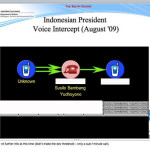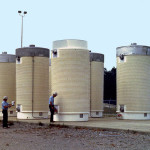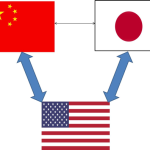- DETERRENCE: U.S. envoy Davies on North Korea policy in Japan
- DPRK: The motivations behind North Korea’s pursuit of simultaneous economic and nuclear development
- ENERGY SECURITY: Can a collapse of global civilization be avoided?
- GOVERNANCE AND CIVIL SOCIETY: Rival party leaders to meet over political standoff
- CLIMATE CHANGE ADAPTATION: Understanding the adaptive capacity of Australian small-to-medium enterprises to climate change and variability
- CLIMATE CHANGE AND SECURITY: Loss and damage is a reality today
Archives
U.S. Alliance system and Northeast Asia regional cooperation

In this Special Report, Chen Jimin makes three observations and three suggestions while discussing the U.S. al…
Indonesia, Australia and Edward Snowden: ambiguous and shifting asymmetries of power

Richard Tanter writes “Courtesy of Edward Snowden, the Australian government is discovering that an asymmetry in electronic surveillance capacity does not trump the fundamental asymmetry of power between Australia and Indonesia. NSA documents that the premier Australian intelligence agency monitored and intercepted phone calls by the Indonesian president, his wife, and inner circle of advisors has generated an extraordinarily rapid collapse in relations between the two governments, possibly with longterm effects. The Indonesian government has called for a new intelligence accord, which will prove difficult for the Abbott government, not least because of the role of the NSA in Australian signals intelligence. A review of supervision and oversight of Australian intelligence agencies is urgently required.”
Richard Tanter is Senior Research Associate at the Nautilus Institute and teaches in the School of Poiltics and Social Science at the University of Melbourne.
Seeking to address the rise of China and non-zero sum relationship modalities: Exploring the Obama administration’s China policy

This is the second half of a two part article from Professor Yang Wenjing of the China Institute for Contempor…
Nautilus Peace and Security Weekly – 28 November 2013
- DETERRENCE: China’s tailored coercion
- DPRK: The economic costs of North Korean nuclear development
- ENERGY SECURITY: UN Climate Change Conference in Warsaw keeps governments on a track towards 2015 climate agreement
- GOVERNANCE AND CIVIL SOCIETY: Protests mount over Japan secrecy bill
- CLIMATE CHANGE ADAPTATION: Case studies on flash flood risk management in the Himalayas
- AUSTRAL PEACE AND SECURITY: PM must agree to spy ‘code of ethics’
Seeking to address the rise of China and non-zero sum relationship modalities: Exploring the Obama administration’s China policy

This is the first half of a two part article from Professor Yang Wenjing of the China Institute for Contempora…
Nautilus Peace and Security Weekly – 21 November 2013
- DETERRENCE: Work of the Advisory Board on Disarmament Matters
- DPRK: U.S. to hold more talks on North Korea with East Asian States
- ENERGY SECURITY: Slowdown in carbon emissions worldwide, but coal burning continues to grow
- GOVERNANCE AND CIVIL SOCIETY: With visits to all 10 ASEAN nations, Abe’s China containment strategy complete
- CLIMATE CHANGE ADAPTATION: Cameron links typhoon Haiyan to climate change
Potential Regional Nuclear Energy Sector Cooperation on Enrichment and Reprocessing: Scenarios, Issues, and Energy Security Implications

This Special Report by David von Hippel looks at the relative impacts of different fuel cycle options on other aspect of (broadly defined) energy security.
In this Special Report von Hippel presents a summary of the current status of and recent trends in electricity consumption in general, and nuclear generation capacity in particular, in the nations of East Asia and the Pacific, offer three future scenarios of nuclear power development in the region (section 2); notes some of the options for nuclear fuel cycle cooperation that have been previously offered for the region, and describe and evaluate four potential scenarios for nuclear fuel cycle cooperation (or non-cooperation) in the region (section 3); and describes some of the key conclusions of the analysis of fuel cycle options for energy security policies in the region (section 4).
David F. von Hippel is a Nautilus Institute Senior Associate. His work with Nautilus has centered on energy and environmental issues in Asia, with a particular emphasis on Northeast Asia and North Korea.
中美日三边关系与三边对话前景

[Chinese Version] This is the second half of a two part Special Report from Professor Yang We…
Nautilus Peace and Security Weekly – 14 November 2013
- DETERRENCE: Extended deterrence and strategic stability in Northeast Asia
- DPRK: A revised assessment of the North Korean KN-08 ICBM
- ENERGY SECURITY: Concentrations of warming gases break record
- GOVERNANCE AND CIVIL SOCIETY: Opposition cries foul as South Korea moves to ban pro-North party
- CLIMATE CHANGE ADAPTATION: Background paper: issues of vulnerability with specific reference to gender in the Asia Pacific – post-2015 framework for disaster risk reduction consultations
- AUSTRAL PEACE AND SECURITY: Gateway to the Indo-Pacific: Australian defense strategy and the future of the Australia-U.S. alliance

